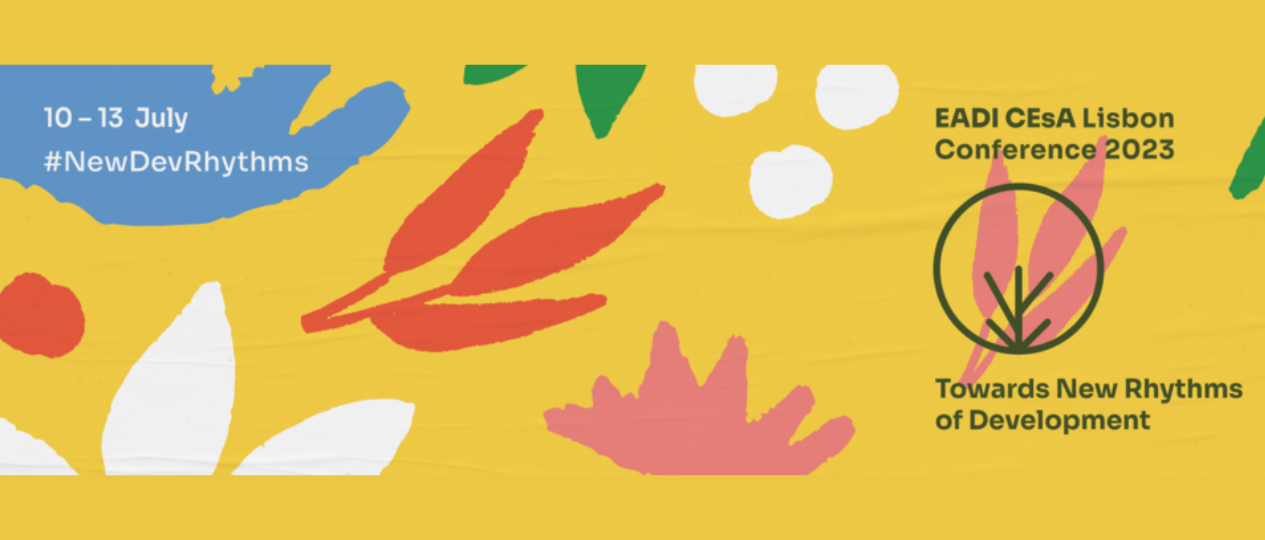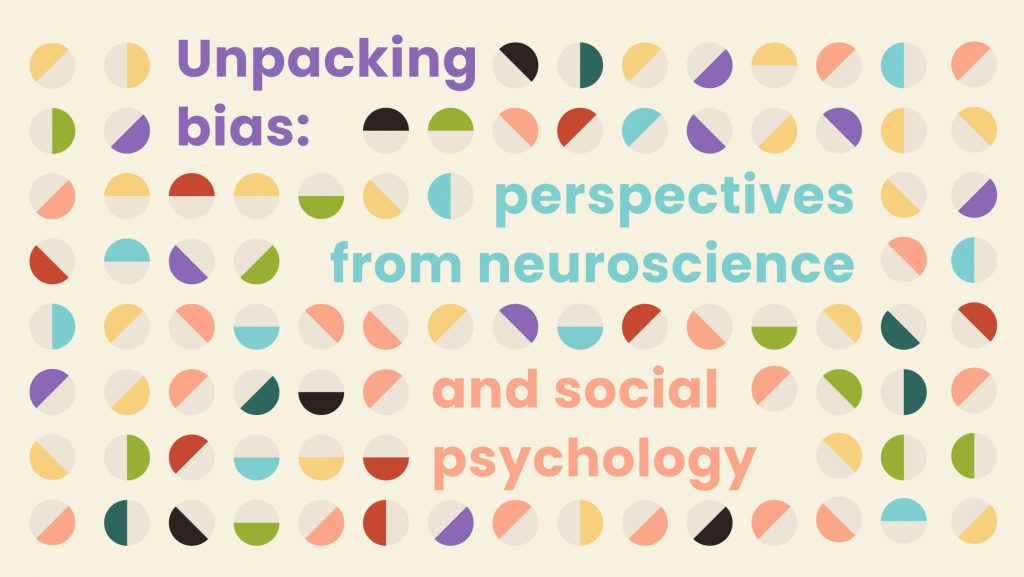CESA
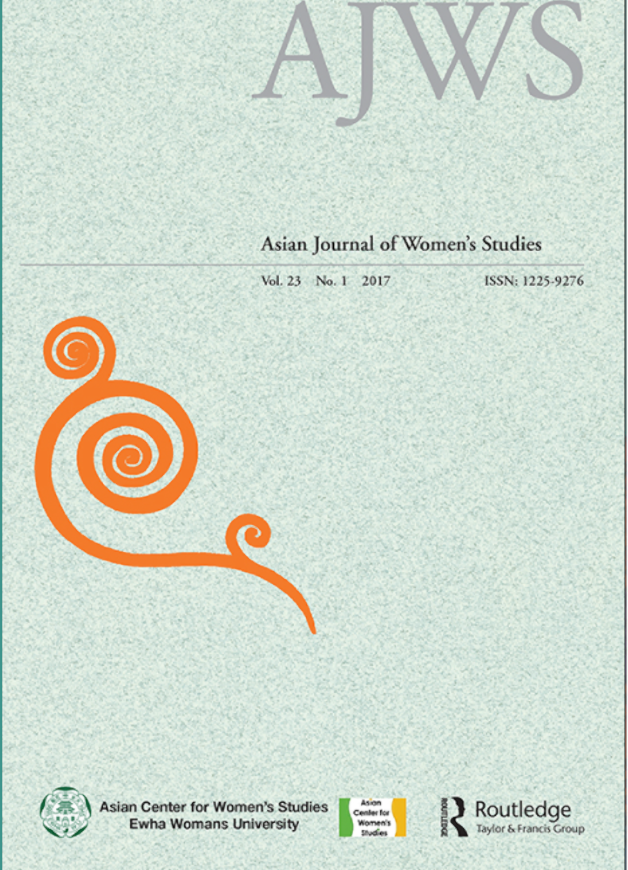
Impact of emergency cash assistance on gender relations in the tribal areas of Pakistan
The most recent article by Asif Igbal Dawar with Marcos Ferreira, Impact of emergency cash assistance on gender relations in the tribal areas of Pakistan (2021), is one of six articles he published throughout his doctoral research.
Abstract:
Impact of emergency cash assistance on gender relations in the tribal areas of Pakistan seeks to make a contribution to the discussion on the consequences of social change brought about by relief programs in humanitarian contexts. It examines the extent to which the Unconditional Cash Transfer (UCT) program (2014–2016) in the Pakistani tribal district of North Waziristan (NW) has influenced patriarchal gender norms in the region, in transforming perceptions about what men and women can do and on changing gender relations. Through interviews conducted in the field between 2017 and 2019, we examine the positive, albeit limited, impact on society and conclude that our study enabled a better understanding of micro practices and processes that challenge the patriarchal structure of society and the norms that sustain it. We illustrate how such processes have started to influence patriarchal norms by improving women’s status both at home and in the community, eventually leading to a shift in traditional perceptions and constructions of gender relations. Although these changes do appear significant, gender equality will continue to face tough challenges in the region and its consolidation depends on the collective efforts of development stakeholders to support unconditional, gender sensitive relief programs that transcend immediate humanitarian and post-humanitarian concerns.
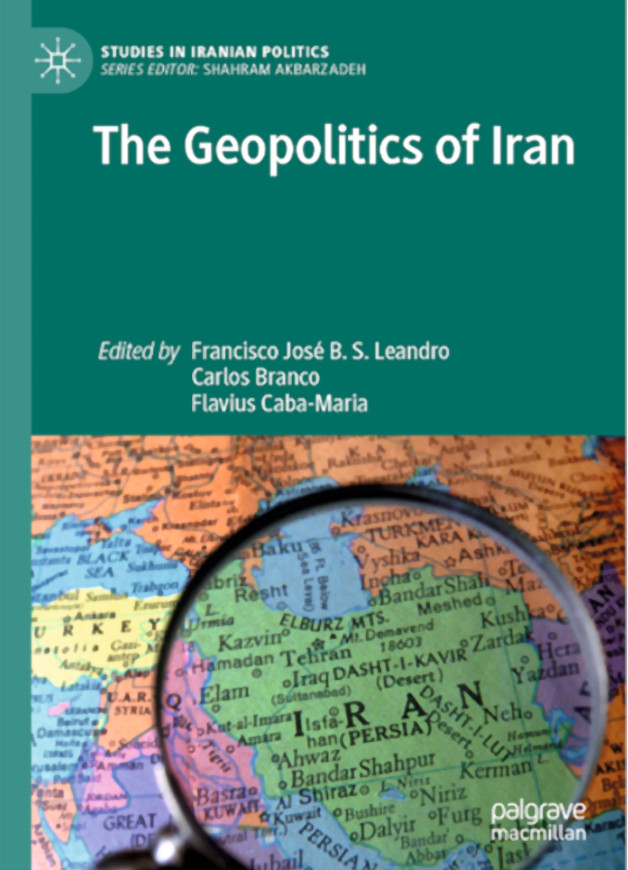
The International Financial Institutions: An ajar door to the external financing of Iran
Authored by Enrique Martínez-Galán, “The International Financial Institutions: An ajar door to the external financing of Iran”, chapter #6, is part of the book “Geopolitics of Iran: Why is it important to the broader Middle East Region?”, which undertakes an examination of the role of Iran in contemporary geopolitics.
Abstract:
While two of the largest International Financial Institutions (IFIs) in the world, namely, the Islamic Development Bank and the Asian Infrastructure Investment Bank, still finance or are planning to finance infrastructure projects in Iran, other two of the largest IFIs, namely, the World Bank Group and the Asian Development Bank (ADB), have been vetoing any financing or participation of Iran in its governance, respectively, under the manifest influence of the United States (U.S.). Besides, the European Investment Bank, the so-called bank of the European Union, managed to resist strong pressures from France, Germany and the United Kingdom back in 2018 to create a special purpose vehicle that could allow the EU to circumvent U.S. sanctions and continue financing projects in Iran. It is interesting to note that international relations were once very different. In fact, Teheran was one of the three candidate cities to host the headquarters of the ADB back in the 1960s. We will discuss in this chapter the role played by IFIs in Iran, and vice-versa. We will frame the discussion in the theoretical frameworks of financial statecraft (Steil and Litan in Financial statecraft: The role of financial markets in American Foreign Policy. Council of Foreign Relations and the Brookings Institution, New Haven and London, Yale University Press, 2006) and of soft power (Nye in Annals of the American Academy of Political and Social Science 616: 94–109, 2008; Nye in Foreign Affairs 88 (4) (July–August): 160–163, 2009). Furthermore, we will show how, despite the U.S. sanctions, the Iranian economy still manages to obtain financing from IFIs. Finally, we will also debate the relevance of the IFIs in the context of the external financing of the Iranian economy. Looking forward, we will draw scenarios for the future relationship of Iran with the IFIs.
About the book:
Geopolitics of Iran: Why is it important to the broader Middle East Region? assesses Iran’s role in contemporary geopolitics. Specifically, it examines three main circles that are related: Iran’s development and political challenges, its relations with neighbouring countries, as well as its relations with the major global powers – China, the European Union, Russia and the United States. It includes contributions from over 20 authors in areas such as contemporary geopolitics, modern history, natural resources, economics, the political-social context and strategic thinking. Particular focus is placed on Iran’s relations with its neighbours – Afghanistan, Iraq, Israel, Pakistan and the Persian Gulf states. In addition, the book offers a bilateral and multilateral dimension on how the nuclear sanctions imposed on Iran have impacted its strategic planning from an economic and military perspective.
Access the book:
https://www.palgrave.com/gp/book/9789811635632
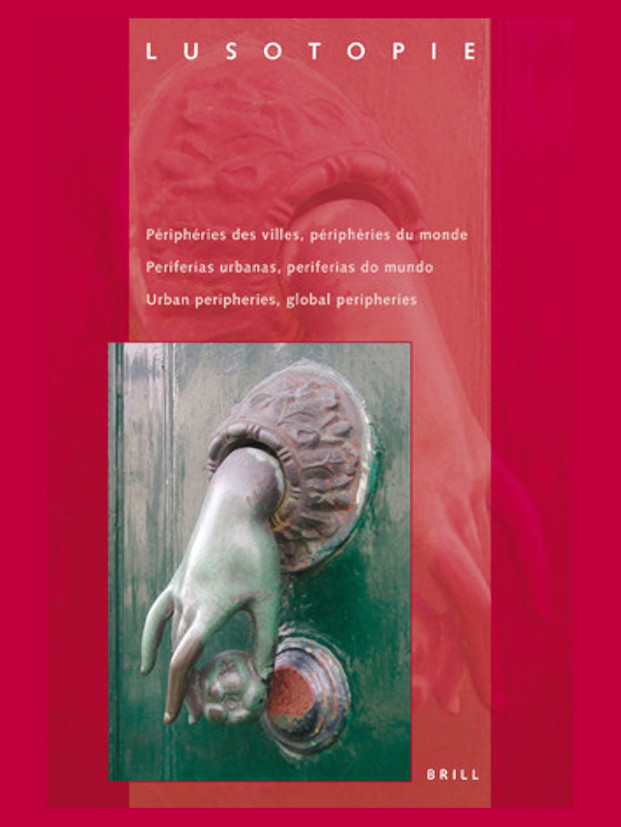
Modern Intimacies and Modernist Landscapes: Chinese Photographs in Late-Colonial Mozambique
Authored by Lorenzo Macagno, Modern Intimacies and Modernist Landscapes: Chinese Photographs in Late-Colonial Mozambique addresses a specific aspect of the social and cultural life of the Portuguese-Chinese in Mozambique. The first contingents, coming from the Chinese province of Guangdong, began to arrive in that region of East Africa in the second half of the 19th century.
Abstract:
Modern Intimacies and Modernist Landscapes: Chinese Photographs in Late-Colonial Mozambique addresses a specific aspect of the social and cultural life of the Portuguese-Chinese in Mozambique. The first contingents, coming from the Chinese province of Guangdong, began to arrive in that region of East Africa in the second half of the 19th century. Most settled in the city of Beira. By the 1950s, the Chinese community was already well integrated into modern life in the colonial Beira. The city was undergoing an unprecedented urban and architectural ebullition. In that period, the Luso-Chinese, in their capacity as merchants, also began to stand out in the field of photography. Based on a multi-sited research among the Luso-Chinese in the diaspora – and their family photo albums – this article reflects on two inseparable aspects of late-colonial modernity: architecture and photography.
Access this article, published in the University of Lisbon’s Repository, here.
18th Doctor in Development Studies
![]()
Fabian Garzon Cuervo is the 18th Doctor in Development Studies at ISEG – Lisbon School of Economics & Management, Universidade de Lisboa, with his thesis defended today (22 June 2021), entitled “Economic Motivations to join Insurgencies in Colombia”, supervised by Professor Carlos Nuno Castel-Branco (CESA/ISEG-ULisboa) and approved with distinction by unanimous vote and praise (Cum Laude).
Congratulations Fabian Garzon-Cuervo!
Bio: https://cesa.rc.iseg.ulisboa.pt/investigacao/investigadores/fgarzon/
The PhD in Development Studies is a 3rd cycle program of studies that aims to provide high quality training and produce original research in the area of Development Studies, a field of interdisciplinary research of the process of economic, social and political changes in modern societies.
This PhD programme was created in 2009 and accredited by the national agency A3ES in 2015. After 2017/18 this program became a joint PhD of ISEG (School of Economics and Management), ICS (Institute of Social Sciences), IGOT (Institute of Geographic and Spatial Planning) and ISA (School of Agriculture) of Universidade de Lisboa, with some changes in its content, recently approved by the national agency A3ES.
The PhD in Development Studies is supported by the Centre for African and Development Studies of the Lisbon School of Economics and Management (ISEG) of the University of Lisbon.
To find out more about the Graduate Studies supported by CEsA, click here.
Conversation “Territórios da Memória”
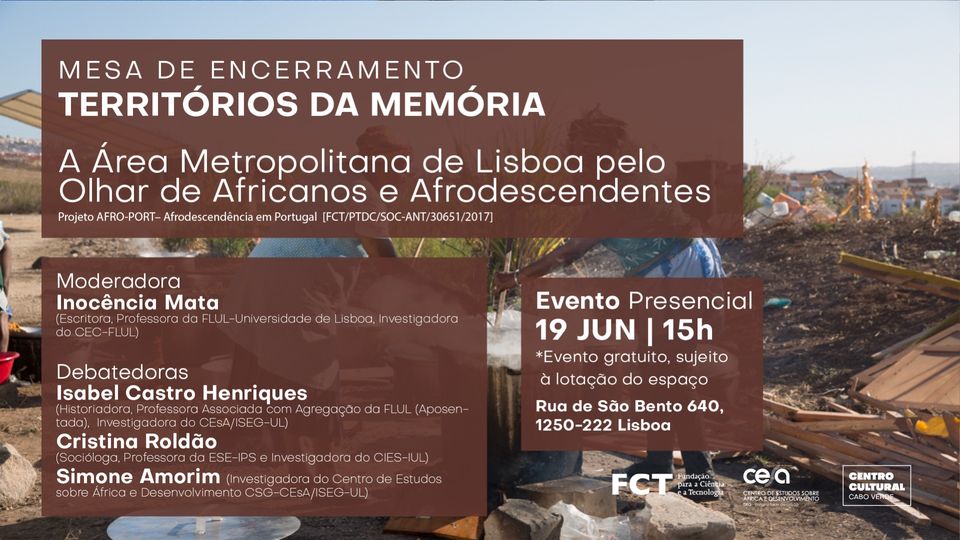
Territórios da Memória, a conversation between Isabel Castro Henriques, Cristina Roldão and Simone Amorim, with moderation by Inocência Mata, at Centro Cultural Cabo Verde, Saturday, dia 19, at 3:00 pm.
The CCCV – Centro Cultural de Cabo Verde and AFROPORT – Afrodescendência em Portugal present, from October 19 to November 27, TERRITÓRIOS DA MEMÓRIA (LANDS OF MEMORY), an audiovisual exhibition that shows for the first time to the public the records collected within the research projects AFROPORT -Afrodescendência em Portugal: sociabilities, representations and socio-political and cultural dynamics. A study in the Lisbon Metropolitan Area (Centre for African and Development Studies/ISEG) and DISCURSOS MEMORIALISTS OF HISTORY (Centre for Comparative Studies/FLUL), in addition to Herberto Smith’s photographs of the São Miguel Arcanjo Festival in the Casal da Mira neighbourhood.
The projects collected, from the horizontal dialogue with the participants, numerous videographic records of the ways of life, sociabilities and discursive practices in various urban latitudes of Africans and Afro-descendants in the Lisbon Metropolitan Area, and the memories of political actors in the historical processes in the Portuguese-speaking African countries, during the colonial and post-colonial periods. From this collection, an audiovisual collection was organised, which will now be available to the public, as a result of a close partnership – to be continued and expanded – with the Centro Cultural de Cabo Verde.
The conversation takes place within the scope of the AFROPORT project, coordinated by Professor Iolanda Évora, hosted by CESA – Centre African and Development Studies at ISEG.
The event will be broadcast online from CCCV.PT (Facebook).
Unpacking bias: perspectives from neuroscience and social psychology
Invited by the Champalimaud Foundation, our researcher Iolanda Évora will speak about prejudice and social psychology at the event Unpacking Bias.
Will we act consciously in all situations? Will we act with racist or sexist prejudices without being aware of it?
We make countless decisions each hour, each minute. Most of these decisions are made without our active awareness and while they may be inconsequential to us, they can impact upon other people. For instance, when we choose a seat on the train next to people who look most similar to ourselves or how much eye contact we make (or don’t make).
In this Ar event, we will start by revealing some surprises hidden within your own unconscious brain. The host Jovin Jacobs – neuroscience researcher at the Champalimaud Centre for the Unknown – will illustrate in an interactive manner how all humans are biased in how we act, react and interact with each other, and how that impacts ourselves and the people around us.
We look beyond the unconscious, to how we can outsmart ourselves and consciously act to stop the perpetuation of discriminatory structures and actions towards our neighbours, colleagues and fellow humans. For this we invite questions from the audience to be discussed at a virtual round table with our speakers and additional expert panellists, bringing both professional and personal perspectives.
Together, we will have explored how implicit and explicit biases are rooted in our brains and surroundings and discussed what we can do to move towards a more inclusive, less discriminatory environment for all.
At the invitation of the Champalimaud Foundation/Champalimaud Foundation, our researcher Iolanda Évora will talk about prejudice and social psychology.
Unpacking Bias will take place on 17 June at 9pm online.
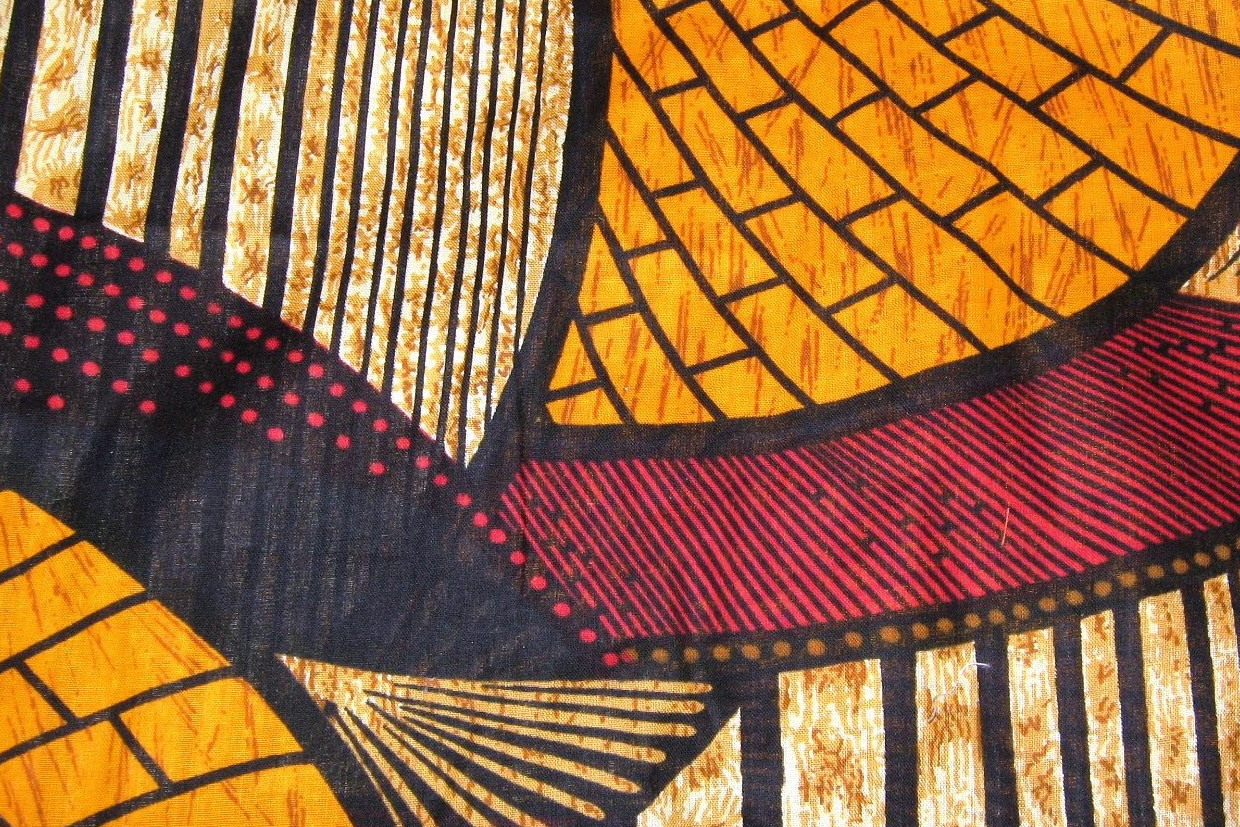
1st Meeting of CPLP Young Researchers on Africa
The 1st Meeting of CPLP Young Researchers on Africa proposes to list a series of conversations with experts from the most diverse areas and to invite a group of young researchers with the global objective of promoting diversity and knowledge about Africa. The debate of ideas and scientific dissemination are at the heart of a living and constantly changing community. With this premise as a starting point, the Organizing Committee, with the institutional support of the Centre for African and Development Studies (CESA-ISEG), União de Cidades Capitais de Língua Portuguesa (UCCLA) and Lisbon School of Economics and Management (ISEG), came together to create a forum for unique debate in the Lusophony space.
The event takes place on the 8th and 9th of July 2021, anticipating the celebrations of the 25th anniversary of the CPLP (July 17th, 1996).
Due to current restrictions and following the DGS rules, the event will have a mixed participation, online and in person. Online participation is open to everyone.
1st Day – 8 July 2021 (UCCLA)
Time: 09:00 am Lisboa (CET)
https://videoconf-colibri.zoom.us/j/81423185515
ID: 81423185515
Time: 02:00 pm Lisboa (CET)
https://videoconf-colibri.zoom.us/j/82543787779
ID: 82543787779
2nd Day – 9 July 2021 (ISEG)
Time: 10:00 am – 06:00 pm Lisboa (CET)
https://videoconf-colibri.zoom.us/j/86236324661?pwd=OXU1UzZ6T09ZUllqWVQvV01OOEFhQT09
Learn more on the guest program of the 1st Meeting of CPLP Young Researchers on Africa and register to receive information on the event here.

III Edition of the International Development Summer Course
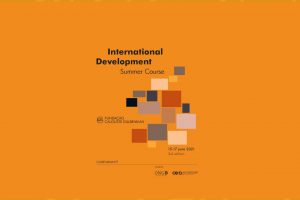
The Calouste Gulbenkian Foundation, the Portuguese Platform of Non-Governmental Development Organizations (NGDO) and the Centre for African and Development Studies of Lisbon School of Economics and Management, Lisbon University (CESA/ISEG) are organizing the III Edition of the International Development Summer Course, which will take place online, from 15th to 17th of June 2021, under the theme “Challenging the future of Global Development”.
As an event focused on building knowledge, critical thinking and finding answers for questions and problems of an interdependent world, the International Development Summer Course, in its previous editions, has been enabling Portuguese and international development stakeholders to engage with the trends and challenges in Global Development. In an increasingly complex international development cooperation scope, views centered on the usual categories, traditional actors, power relations that emanate from the division between “rich countries in the North” and “poor countries in the South”, are becoming obsolete and inadequate to create a new world that “leaves no one behind”. When a global pandemic affects the way people connect, the way we dream of a better world is crucial to find new types of finance for development beyond aid, global regulations and knowledge dissemination.
Competences such as resilience, adaptability and openness are increasingly in demand to enable the design and the implementation of innovative approaches capable of dealing with the current social, economic, cultural and political challenges. “Challenging the future of Global Development” will be led by well-known, nationally and internationally, development thinkers and professionals.
The event will take place between the 15th and 17th of June 2021 and will have several public online sessions, with Portuguese and English translation, under the following topics:
- Rethinking Development Cooperation for post-pandemic World;
- Building Genuine and legitimate Partnerships;,
- Liberal globalization paradigm in perspective: Democracy and economy;
- Financing for Development: new trends on a multiplex world;
- Trade Justice and Development: Sustainable production and consumption;
- Public Sphere and Civic Space.
Interested participants will be able to sign up for all sessions or create their own program by registering only in their favourite panels.
Learn more and perform registration on NGOs Portuguese Platform website here.
PhD student in Development Studies awarded with the Best Novel Research Award
We congratulate Mojgan Chapariha, PhD student in Development Studies at ISEG, Universidade de Lisboa, by the Best Novel Research Award offered by the Canadian Society for Ecological Economics (CANSEE) for her PhD research entitled Sustainable Development Goals (SDGs) and transitioning towards an economy based on human and ecological well-being’. Mojgan Chapariha research is supervised by Professor Emeritus at York University Peter Victor and Professor Olívia Bina (ICS/ULisboa).
